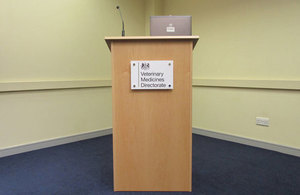The UK Hydrographic Office (UKHO) has today welcomed the UK’s Secretary of State for Defence, the Rt Hon Gavin Williamson CBE MP, to its Taunton headquarters.
The Secretary of State met with UKHO staff to talk about its role in supporting maritime navigation, safety, security and marine development around the UK and worldwide, and was given a tour of its new office.
As a leading hydrographic office and marine geospatial information agency, the UKHO plays a critical role in supporting the UK government’s National Security Strategy (NSS) and in fulfilling the Government’s obligation to provide navigational charts and publications to ships transiting UK waters.
Working with several UK and international partners, the UKHO also carries out work under government programmes such as the Overseas Territories Seabed Mapping Programme and the Commonwealth Marine Economies Programme to improve global standards in safety, hydrography and navigation. This includes collecting and processing marine geospatial data to help governments protect the environment, develop infrastructure (such as ports) and support disaster planning and resilience. These factors support the sustainable economic growth for coastal states across the world including Anguilla, the British Virgin Islands, the Cayman Islands, St Helena, Guyana, Vanuatu and Tuvalu.
The Rt Hon Gavin Williamson CBE MP, Secretary of State for Defence, said:
For 200 years UKHO has been central to trade and commerce across the globe, supplying over 90% of the world’s ships with the products they need to navigate international waters safely.
The UKHO embodies the spirit of a Global Britain – sharing the UK’s world leading expertise to develop relationships and trade with partners around the world. With 95% of the UK’s trade carried by sea, the work done at this facility is vital to not only supporting safety of our ships but supporting the UK’s thriving ocean economy.
The Secretary of State’s visit also comes as UKHO continues to contribute to the UK Government’s Geospatial Commission, an expert committee with the Cabinet Office set up to maximise the value of all UK Government data linked to location, and to create jobs and growth in a modern economy.
Drawing together the combined expertise of HM Land Registry, the Ordnance Survey, the British Geological Survey, the Valuation Office Agency, and the Coal Authority – as well as UKHO – the Geospatial Commission will drive the move, to use this data more productively – which could unlock up to £11 billion of extra value for the economy every year.
Rear Admiral Tim Lowe CBE, Acting Chief Executive, UKHO, said:
We are delighted to welcome the Secretary of State for Defence to visit UKHO, meet our expert staff and see first-hand the important work that we are doing. As a world-leading Hydrographic Office and marine geospatial agency we are continuously working to enable the maritime and marine sectors for the UK Government, as well as our friends and allies around the world.
This is an exciting time for UKHO as we build on a strong legacy of support to the mariner and continue to diversify and transform the way we develop and deliver our products and services. Last year we invested significantly in both our technology and our people – as evidenced by our expanding science and technology teams, which comprises experts across data science, scientific analysis and software engineering disciplines.
Hydrographic and marine geospatial data is fundamental to anyone operating in the marine and maritime domain and can hold the key to increased prosperity for the UK and our Overseas Territories. We hope that this visit continues to raise awareness of the important role that UKHO has to play in the sustainable development of our oceans at home and abroad.
